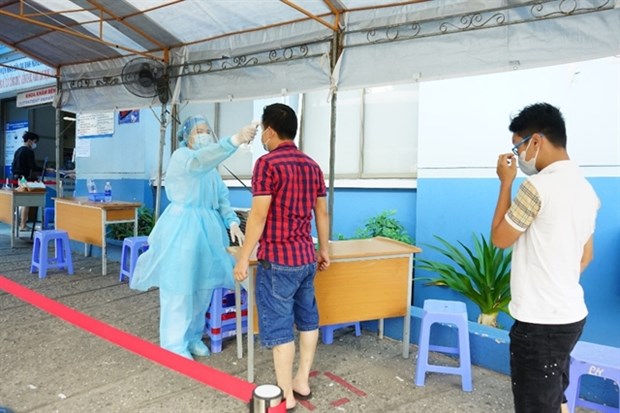 A health worker at Gia Dinh People’s Hospital checks the temperature of people visiting the hospital (Source: www.bvndgiadinh.org.vn)
A health worker at Gia Dinh People’s Hospital checks the temperature of people visiting the hospital (Source: www.bvndgiadinh.org.vn)has instructed health facilities to
carry out methods to protect from COVID-19.
Facilities should apply
the Ministry of Health’s 37 criteria for the prevention and control
of and other acute respiratory infections as well as other
regulations on prevention at hospitals, in addition to the
city department’s 14 criteria on preventing facilities from becoming
sources of transmission.
The department has also
instructed health facilities to conduct health declarations and check
temperatures of patients, their relatives and anyone
visiting departments where seniors are treated and others with
chronic diseases. Relatives should not be allowed to visit patients
in these departments.
Health facilities should set up
at least one booth at inpatient departments to isolate patients or
their relatives if they have a fever and other symptoms of COVID-19.
They should not
let patients share beds and should maintain a minimum distance between
beds, according to department regulations. Separate areas for
patients and their relatives at these departments should be set up.
One of the other preventive
measures is to limit senior patients and those with chronic diseases from
going to crowded areas in hospitals. These patients should be
given priority for testing, ultrasounds and X-rays at their beds.
Patients with chronic kidney
failure should receive dialysis as scheduled, and those who are
quarantined and need dialysis should be taken to a separate area in
health facilities.
Health facilities should
closely observe departments where senior patients and those with
chronic diseases are being treated to ensure compliance of health
officials, patients and their relatives.
Inpatients should be discharged
from hospitals when their health is stable, and the time for
follow-up examination should be extended for no more than 90 days for
patients with chronic disease.
Patients should
receive their health records and be given follow-up examinations
at health centres or district-level hospitals near where they live.
The department also instructed
health facilities to communicate with discharged patients via digital
means or phone about counselling and guidance on self-care at their
homes.
should
strengthen telemedicine for older patients and those with chronic
diseases, according to the department’s instructions.
Speaking at an online
conference with ministries, provinces and cities held on August 21, Duong Anh Duc,
Vice Chairman of the HCM City People’s Committee, said the city had had 16 COVID-19
incidences since July 25, including eight related to the outbreak in Da
Nang. The remaining had returned from other countries and were quarantined
when they arrived at Tan Son Nhat International Airport.
These patients were treated at
hospitals and their health is stable, according to Duc.
As many as 53,719 people have
returned from Da Nang to HCM City as of August 21, and they have been
tested and have filled out health declarations.
The city had not recorded a
locally transmitted COVID-19 incidence for 23 days, Duc said, adding that
this reflected effective cooperation between local authorities and health
officials in locating, tracing, testing and stopping the spread of the virus.
The city had isolated and
tested 126 people who have entered the country illegally, including one who
tested positive for SARS-CoV-2. It was also carrying out surveillance
of patients who had been discharged and those who had returned from
quarantine areas in provinces. Foreign flight crews, seafarers and experts
entering the city for work were still being quarantined.
Domestic terminals at
airports should continue to be controlled, Duc said.
The city has 13 health
facilities designated by the Ministry of Health to
conduct tests with the capacity of 9,000 samples per day. They
aim to have more than 13,000 samples per day.
In the upcoming time, the
Department of Health will have specific measures for people who are given
priority for tests. The Centre for Disease Control has been told
to use software to supervise and classify people who
are given priority for testing.
The city still
requires limited gatherings and participation in nonessential
activities. It has asked people to install the Bluezone application on
their phones. The app helps detect and trace people who could be
potential transmitters of the disease in the community.
People who do not wear masks
in the city are fined./.
Source: VietnamPlus
